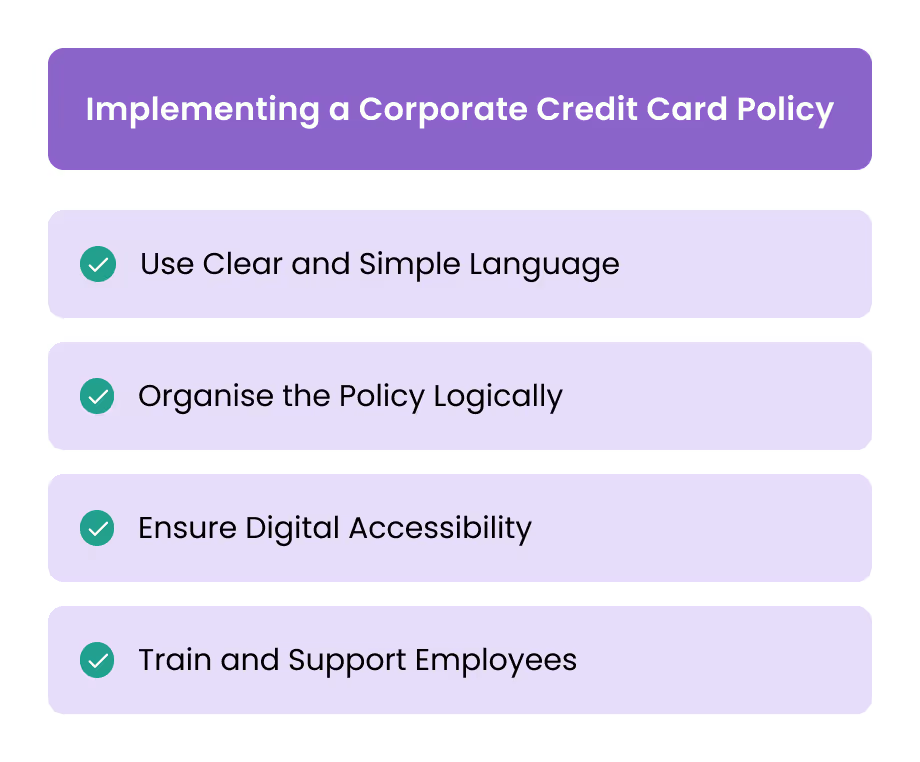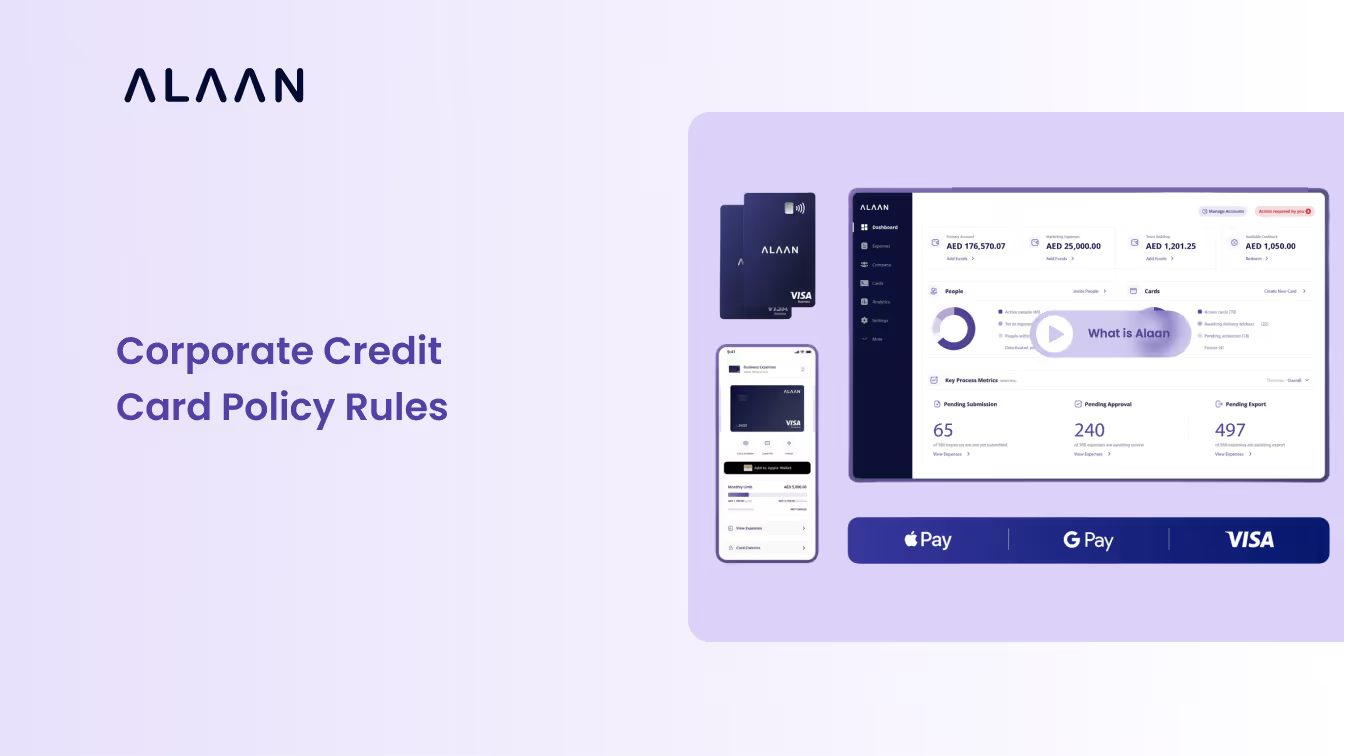Corporate Credit Card Policy Rules and Best Practices
Managing corporate expenses effectively is crucial for business success. Without clear guidelines, businesses often struggle with inefficient processes such as chasing receipts, correcting errors, and managing employee spending, which can take up valuable time. The stakes are even higher when financial mismanagement becomes a concern. According to the Association of Certified Fraud Examiners (ACFE), businesses lose 5% of their annual revenue to occupational fraud, with expense misuse being a key factor.
In regions like the UAE and Saudi Arabia, managing corporate spending becomes more complex due to strict VAT compliance requirements. A corporate credit card policy is the key to streamlining expense tracking, reducing manual errors, and ensuring that spending stays within the company’s guidelines.
By having a strong corporate credit card policy in place, you provide your team with the tools to spend responsibly, all while ensuring your business stays compliant and financially efficient. This blog will walk you through the essential steps to create a corporate credit card policy that works for your business.
[cta-1]
Understanding Corporate Credit Card Policies
A corporate credit card policy is a formal document that outlines the rules and guidelines for using corporate credit cards within an organisation. It’s a guide that ensures employees use corporate credit cards responsibly while keeping their spending aligned with your business’s financial goals. This policy lays out who can use corporate credit cards, what expenses are allowed, and how transactions should be reported.
Benefits of a Clear Corporate Credit Card Policy
By establishing a clear policy, you can manage finances more effectively and ensure your team follows the guidelines:
- Improved Financial Control: You can set spending limits and define approved expenses to monitor and manage employee spending more effectively.
- Reduced Misuse: Your team will understand what counts as appropriate use, minimising unauthorised or fraudulent expenses.
- Enhanced Compliance: A clear policy ensures all transactions meet local tax and regulatory requirements, protecting your business from penalties.
- Streamlined Expense Management: Tracking and reporting expenses becomes easier for both your employees and your finance team, saving time and effort.
- Increased Accountability: When employees understand the rules and consequences, they tend to spend more responsibly.
Now that you understand the benefits of having a clear corporate credit card policy let's look at the key elements that make it effective.
Key Elements of a Corporate Credit Card Policy
Your corporate credit card policy should be built on a strong foundation of clear guidelines and actionable steps. This ensures that every corporate credit card issued aligns with the company’s financial goals.
1. Define Eligibility for Cardholders
Not every employee needs a corporate credit card. Eligibility should be tied directly to job responsibilities and the necessity for business-related expenses. Common eligible roles include:
- Sales and Business Development: For client meetings and travel.
- Project Managers: For procurement of project-specific supplies.
- Executives and Senior Managers: For representation and official purposes.
2. Specify Allowed and Prohibited Expenses
Define allowed and prohibited expenses to maintain clarity:
Allowed Expenses:
- Travel costs, such as airfare, accommodation, and transportation for business purposes.
- Meals during client meetings or official travel.
- Office-related purchases, including subscriptions and supplies.
Prohibited Expenses:
- Personal items like groceries, clothing, or leisure activities.
- Non-essential purchases unrelated to work requirements.
- Entertainment costs not tied to official business purposes.
3. Establish Role-Based Spending Limits
Tailor spending limits based on job responsibilities. For instance:
- Sales Executives: Higher limits for frequent travel and client engagements.
- Administrative Roles: Lower limits for occasional procurement.
4. Standardise Documentation Requirements
Set clear documentation guidelines to ensure consistency:
- Receipts for All Transactions: Employees must submit clear, original receipts.
- Expense Reports: A brief note explaining the purpose of each expense.
- Submission Deadlines: Expenses should be reported within 7–10 days to avoid delays in processing
Expense management software can streamline reporting and ensure documentation consistency, making reviews easier for finance teams.
Now that you know the key elements of a corporate credit card policy, let's learn the responsibilities of cardholders.
[cta-2]
Responsibilities of Cardholders
As a cardholder, following the corporate credit card policy is not just about adhering to rules—it’s about helping the organisation stay financially secure and compliant. Below are the key responsibilities for cardholders to keep in mind:
1. Using the Card Exclusively for Approved Purposes
Corporate credit cards are strictly for business-related expenses. Every transaction should align with the company’s list of allowable expenses. Personal purchases, even if reimbursed later, are not allowed. Misusing the card can result in disciplinary action, including losing card privileges or even termination.
2. Expense Documentation and Reporting
Establish clear guidelines for documentation and reporting:
- Retain Original Receipts: Keep a copy of every purchase receipt made with the corporate credit card.
- Submit Expense Reports on Time: Ensure detailed expense reports, including the purpose of each purchase, are submitted within the company’s specified timeframe.
3. Ensuring Card Security and Reporting Loss or Theft
Take these steps to ensure the card is secure from potential fraud:
- Protect Card Information: Always secure the card and its details to prevent unauthorised use.
- Report Issues Immediately: If the card is lost, stolen, or compromised, notify the manager and the card issuer as soon as possible to minimise risks.
While understanding cardholder responsibilities is crucial, preparing for unexpected situations is equally important. Read on to learn how to handle them.
Handling Exceptions and Emergencies
Even with a well-defined corporate credit card policy, situations may arise that require flexibility. Having a clear process for handling exceptions and emergencies ensures that necessary expenses are managed responsibly without compromising financial control.
1. Process for Gaining Authorisation for Exceptions
Follow these steps to ensure proper approval for exceptions:
- Seek Prior Approval: Employees need to submit a request explaining the nature of the expense, its purpose, and any supporting documents.
- Designated Approvers: Ensure there is a clear approval hierarchy, such as department heads or senior managers, who can authorise exceptions.
- Keep Records: All approved exceptions should be documented, including the reason for the exception and who authorised it for transparency and auditing purposes.
2. Emergency Spending Provisions and Required Approvals
Implement clear guidelines for handling emergency expenses:
- Define Emergencies: Clearly specify what qualifies as an emergency, such as urgent client travel, critical equipment repairs, or unforeseen operational needs.
- Temporary Flexibility: Employees can proceed with emergency expenses, but they must notify their manager as soon as possible.
- Post-Emergency Reporting: Employees should submit detailed reports, including receipts and explanations, within a defined timeframe (e.g., 48 hours) after the emergency expenditure.
- Streamlined Approvals: Assign a rapid response team or manager who can quickly review and approve emergency expenses.
Handling exceptions is vital, but enforcing the policy is equally important. Here's how policy violations are managed.
Enforcement and Consequences for Policy Violations
Having a corporate credit card policy is only effective if it’s backed by clear enforcement measures. Outlining the consequences for violations helps keep everyone accountable and discourages misuse.
1. Addressing Policy Violations
Take appropriate action to address violations effectively:
- Warning: Minor mistakes, like accidental misuse, can often be corrected with a formal warning. It’s a helpful way to address the issue without escalating unnecessarily.
- Loss of Card Privileges: Repeated violations or more serious issues may require suspending or permanently revoking the cardholder’s access.
- Disciplinary Actions: Depending on the situation, this could include extra training, probation, or other steps to ensure the policy is followed in the future.
2. Handling Serious Violations
Take decisive action for serious violations to protect the company:
- Termination of Employment: Intentional misconduct involving corporate credit cards can lead to immediate dismissal.
- Legal Action: In cases like fraud or theft, the company may need to take legal steps to recover losses and hold the individual accountable.
Now, let’s focus on proactive strategies with best practices for managing corporate credit card Policies effectively.
Best Practices for Managing Corporate Credit Card Policies
Implementing a corporate credit card policy is essential for financial control and compliance. To ensure its effectiveness, consider the following best practices:
1. Collaborative Policy Drafting Involving Key Departments
Engage key departments to ensure a comprehensive and effective policy:
- Finance: Provides insights into financial controls and reporting requirements.
- Human Resources: Ensures alignment with company policies and employee guidelines.
- Legal: Addresses compliance with local laws and regulations.
- Operations: Offers practical perspectives on daily business needs.
2. Regular Updates to Reflect Current Business Needs
Ensure the policy remains relevant and effective:
- Periodic Reviews: Schedule regular assessments to identify areas needing adjustment.
- Adapt to Changes: Modify the policy in response to shifts in business operations, market conditions, or regulatory requirements.
- Communicate Updates: Inform all employees promptly about any changes to ensure continued compliance.
3. Employee Training for Policy Compliance
Ensure employees understand and adhere to the policy:
- Initial Training: Provide comprehensive onboarding sessions for new cardholders.
- Regular Refreshers: Conduct periodic workshops or e-learning modules to reinforce policy knowledge.
- Clear Communication: Use straightforward language and real-world examples to illustrate policy applications.
Best practices set the strategy, while implementation tips focus on practical steps to make your policy effective. Here are actionable tips to ensure your corporate credit card policy works.
Tips for Implementing an Effective Corporate Credit Card Policy
Implementing a corporate credit card policy requires a practical approach to ensure it runs smoothly. Here are some key tips to help you put your policy into action and keep it working effectively for your business.

1. Use Clear and Simple Language
Ensure the policy is easy for everyone to follow:
- Write for All Employees: The policy should be easy to understand for everyone, not just finance professionals. Avoid jargon and stick to straightforward language.
- Focus on Key Information: Highlight the most important points, like spending limits, reporting processes, and prohibited expenses.
- Provide Real-World Examples: Use specific scenarios or FAQs to show how the policy works in everyday situations.
2. Organise the Policy Logically
Straightforwardly arrange the policy. For instance:
- Structured Format: Use headings, subheadings, and bullet points so employees can easily find what they need.
- Group by Relevance: Arrange similar topics together, such as eligibility, documentation requirements, and enforcement measures.
- Quick-Access Summary: Provide a brief overview at the start for quick reference to key rules.
3. Ensure Digital Accessibility
Make the policy easily accessible and user-friendly:
- Centralised Location: Make the policy accessible on your company’s intranet, employee portal, or shared cloud platform.
- Regular Updates: Keep the digital version up to date with any changes and track these updates for transparency.
- Interactive Features: Add hyperlinks within the document to guide employees to additional resources or FAQs.
4. Train and Support Employees
Ensure employees are well-informed and supported:
- Onboarding Support: Provide new employees with a quick walkthrough of the policy during their onboarding process.
- Periodic Refreshers: Hold regular training sessions to inform everyone about updates or clarifications.
- Helpdesk Availability: Set up a dedicated channel where employees can ask questions or report issues related to the policy.
How Alaan Enhances Corporate Expense Management Policies
At Alaan, we understand that managing business expenses effectively requires more than just setting a policy—it calls for tools that enable seamless tracking, compliance, and oversight. While Alaan corporate cards are prepaid and not traditional corporate credit cards, they are designed to complement your corporate expense management policies. By offering features like automated expense tracking, VAT compliance support, and real-time visibility, Alaan simplifies expense management, ensuring operational efficiency and transparency.
1. Align Your Policy with Smarter Expense Management
Our platform takes your corporate credit card policy from paper to practice by offering features that directly support its implementation:
- Automated Expense Tracking: Say goodbye to manual reconciliations. Alaan integrates all card transactions directly with accounting tools like Xero, QuickBooks, and Zoho, ensuring accurate reporting and alignment with your policy’s documentation requirements.
- Custom Spending Limits: Set department- or employee-specific spending limits and vendor restrictions to maintain budget discipline and prevent overspending.
- Real-Time Expense Visibility: Gain live insights into transactions, helping you monitor compliance with your policies and identify potential issues early.
2. Built to Simplify Policy Enforcement
Our platform addresses the specific challenges of Middle Eastern businesses, ensuring it supports compliance with regional regulations and the complexities of expense management:
- VAT-Compliant Reporting: Easily track, categorise, and file expenses in line with your policy’s tax reporting requirements.
- Multi-Currency Support: Manage cross-border expenses without the administrative burden, keeping your policy flexible and globally applicable.
- Approval Workflow Automation: Establish multi-level approval processes for all expenses, ensuring they are reviewed and approved before being finalised.
3. Empower Cardholders to Follow Your Policy
Alaan simplifies the user experience, empowering employees to follow corporate credit card policies without additional effort:
[cta-7]
- Instant Card Issuance: Issue virtual or physical cards instantly, ensuring employees can make approved purchases without delays.
- Contactless Payments: Our corporate cards are compatible with Apple Pay and Google Pay, allowing for secure, seamless transactions.
- Expense Categorisation: Employees can upload receipts directly through our platform, where AI automatically matches and categorises them, reducing manual effort and errors.
Conclusion
Having a clear corporate credit card policy isn’t just a formality—it’s a smart way to protect your business and make managing expenses easier for everyone. When employees understand the rules and processes, it’s simpler to maintain financial integrity, avoid misuse, and stay compliant with regulations.
By following best practices like updating the policy regularly, collaborating across teams, and providing proper training, you can minimise risks and create a smoother experience for your business.
At Alaan, we’re here to make your expense management hassle-free. Our corporate cards and platform are built to help you implement policies effectively while automating tracking and reporting. Want to see how it works? Schedule a free demo with Alaan today and take the first step toward smarter expense management.


.avif)







